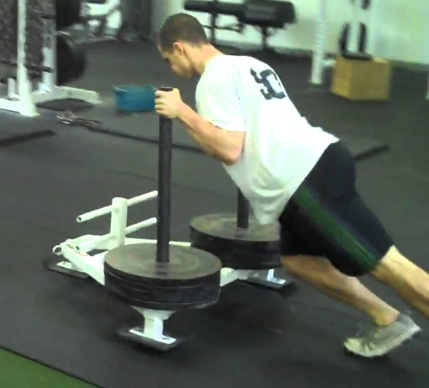
Emotional Detachment for Training Success
About eight years ago, I had a defining moment in my career during a training session. Twice a week, I would train two guys who had been wildly successful in their careers – to the point that they’d both been able to retire in their early 40s. It was an absolute blast to work with them, as they were both huge sports fans and would constantly bust one another’s chops during training sessions. One day, one of them finished up his set of Prowler pushes, and remained “slumped” over the Prowler for 20 seconds or so, working to catch his breath.
Once he regained it, he looked up at me and said, “You know, Eric, I’m really just doing this so that I can drink beer and eat pizza during Patriots games and not feel guilty.”
It was a big eye opener for me to realize that my fitness goals for him were a lot loftier than his goals for himself. Sure, we trained in a safe and effective manner and he got great results, but was I really doing all I could do to make exercise actually seem fun for him?
I think we take for granted how much we, as fitness professionals, love to train. We convince ourselves that clients don’t mind eating out of Tupperware every two hours. And, we assume that heavy deadlifts get these clients so excited that they have erections lasting more than four hours. Sorry, but most people just don’t look forward to exercise – or enjoy it during the sessions – as much as us fitness lunatics do.
Here is where we learn one of the most important lessons in terms of improving client adherence, retention, and long-term success:
You need to be emotionally attached to your clients,
but emotionally detached from a training style.
With respect to the former point, you should go out of your way to make clients know that you genuinely care about them and want to help them get to where they need to be. They really should be like extended members of your family. Heck, there have been times in my life when I’ve spent more hours with certain clients in a given week than I have with my own wife! Don’t neglect the importance of being a friend before you become a coach or trainer.
On the other hand, though, you must emotionally detach yourself from a training system. We know that in our own training, we sometimes have to do things we don’t enjoy in order to make progress; we have to emotionally detach ourselves from the exercises we enjoy. This also applies with how we manage clients, but in the opposite direction.
In other words, just because you love Powerlifting doesn’t mean a client will always want to lift heavy. Just because you enjoy broccoli doesn’t mean that a client won’t abhor the stench of it. Just because you think it’d be cool to drop $10,000 on a souped-up leg press doesn’t mean that it’ll over any benefit whatsoever for your clients. And, just because you feel like you look good in a tight-fitting sleeveless shirt doesn’t mean that potential clients won’t joke with each other than you look like a raging, self-consumed tool. Sorry, but it’s the truth.
Candidly, I think this is one reason why Crossfit has gained popularity so fast. Effectively, it allows people to “ride several horses with one saddle” with their training. If there is one part of training (e.g., heavy lifting) that they don’t like, there is something else (e.g., metabolic conditioning, gymnastics movements, Olympic lifts) that might get them fired up. Add in great camaraderie – which makes clients feel the emotional attachment to people and not just a system – and you’ve got a recipe for a successful training business.
At the end of the day, what’s the takehome message? Be a good person, and be open-minded to new ways to evaluate, program, and coach. If you’re looking for a tremendous resource to help you in this regard, I’d highly recommend Elite Training Systems, a collaborative product from Mike Robertson, Wil Fleming, Tyler English, Dave Schmitz, Steve Long, and Jared Woolever. This product delves into how to write effective strength and conditioning programs, as well has how to run the business side of things. I like it so much that I contributed several bonus videos of my own. It’s on sale at a great introductory price; check it out HERE.





